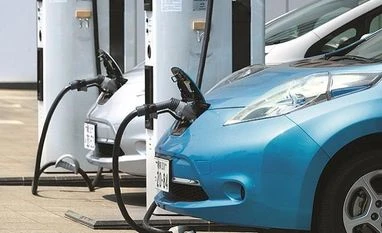A corporate taxi service operator in the National Capital Region (NCR) is ecstatic. Till last month, getting “green” high-security number plates for their electric car fleet was turning out to be an uphill task. But August onwards, electric cars have started getting green number plates to give them a distinct environment-friendly identity.
This identity, that sets them apart as non-polluters compared to fossil fuel-driven vehicles, is the business model for a clutch of start-ups that are promoting electric mobility parallel to the government’s electric public transport.
The start-ups operating electric taxi service — mainly across NCR, Bengaluru and Mumbai — are even helping give a scale to the initial sales of electric car models of Mahindra and Tata. Bengaluru-based Lithium Urban Technologies, for instance, uses Mahindra e2o for up to 100 km, e2oPlus for 120 km, and eVerito for 140 km.
“We currently use Mahindra electric vehicles (EVs) and are happy to explore other EVs as and when they become available. Ideally, Lithium would like to have a variety of products in the offering to provide flexibility to our corporate clients. However, currently there is a limitation in the product availability but with government push, more EVs will be launched soon,” says Sanjay Krishnan, chief executive officer, Lithium Urban Technologies, an IFC and LGT Capital Advisors-funded EV fleet operator.
Lithium has completed 80 million km in the past four years and saved 17,000 tonne of CO2, which is the same impact as having 48 Lodhi Gardens in Delhi, 43 Cubbon Parks in Bengaluru, 34 Kamla Nehru Parks in Pune and 3 KBR Parks in Hyderabad, says Krishnan.
Lithium owns a fleet of over 850 vehicles, running more than 250 km a vehicle by completing more than 10,000 daily trips.
Blu Smart — another start-up supported by the promoters of renewable energy company Gensol — has 70 electric cars currently operational in NCR. Some 200 new electric cars from Tata and Mahindra are joining its fleet this month. The company aims to add 770 electric cars by November 2019, based on the supply schedules from the manufacturers.
Gurugram-based Blu Smart raised an angel round funding of $2.2 million in July this year from Hero Motors family office, Centrum-Acorn VC Fund, JITO Angel and Micromax. Unlike Blu Smart — which is into app-based consumer service — Lithium services over 25 marquee clients such as Google, Adobe Systems, Barclays, Wipro, Accenture, VMware, Tesco, Mercedes Benz, Credit Suisse etc. in eight cities.
Krishnan says the future of mobility is “shared, connected and electric”. According to him, taxi is the prime segment to convert into electric as it runs on an average 200 km a day and so the payback period of extra upfront cost would be less for it. There are 4 million people employed in the IT/ITES sector. This has a huge market potential.
“Corporates that provide transport benefits to their employees are concerned about the bottom line and the environment. They can benefit the most by switching to electric.”
According to Punit Goyal, co-founder, Blu Smart Mobility, the demand for shared mobility will continue to grow, driven by three mega trends — urbanisation, sustainability and sharing economy. Blu Smart offers ridesharing, carsharing and shared charging solutions through one mobile application.
A to Z Universal Solutions that runs eee-Taxi is doing employee transportation system duties through corporate firms and ride hailing through cab aggregators. “No one in the industry is running the fleet like we do. We are not just vanilla taxi operators; we are an end-to-end e-mobility solution provider,” says Nishant Saini, managing director. The company has 150 Mahindra eVeritos running on the road.
Saini points out that EVs will become a more than $300-billion market by 2030. Charging of these vehicles is still a constraint and, therefore, all the players in this segment have created their own captive charging stations. They majorly rely on Mahindra eVeritos which have a range of about 150 km at 100 per cent charge, a range at which taxi operations become profitable.
The fuel cost of an electric taxi is Rs 1.25 a km as against diesel and petrol cost of Rs 6–6.5, though the upfront cost of electric car is more.
Goyal says if Uber and Ola are the Mobility 1.0 innovation because of on-demand ride sharing, Smart Mobility 2.0 requires sustainable long-term solutions to address the challenges of noise and air pollution. “Electric cars have no tailpipe emissions while concerns on traffic congestion are addressed through ridesharing and carsharing over individual car ownership,” says Goyal.
Unlock 30+ premium stories daily hand-picked by our editors, across devices on browser and app.
Pick your 5 favourite companies, get a daily email with all news updates on them.
Full access to our intuitive epaper - clip, save, share articles from any device; newspaper archives from 2006.
Preferential invites to Business Standard events.
Curated newsletters on markets, personal finance, policy & politics, start-ups, technology, and more.
)